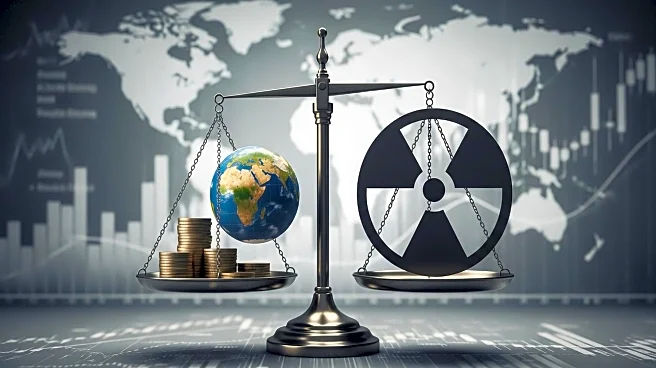What is the story about?
What's Happening?
France, Germany, and the United Kingdom have initiated a process to reimpose United Nations sanctions on Iran due to concerns over its nuclear program. This move, known as 'snapback' sanctions, follows a 12-day conflict between Iran and Israel, during which Iran's atomic sites were bombed. The sanctions aim to freeze Iranian assets abroad, halt arms deals, and penalize the development of Iran's ballistic missile program. The decision has sparked diplomatic tensions, with Iran's Foreign Minister Abbas Araghchi condemning the action as unjustified and illegal. The sanctions process starts a 30-day countdown, during which intensified diplomacy is expected, particularly as the U.N. General Assembly convenes next month.
Why It's Important?
The reimposition of sanctions on Iran is significant as it could further destabilize the country's already struggling economy, which has seen its currency, the rial, fall to near-record lows. The sanctions are intended to pressure Iran into compliance with international nuclear agreements, but they also risk escalating tensions in the Middle East. The move could impact global oil markets, as Iran is a major crude oil supplier, particularly to China. Additionally, the sanctions could influence Iran's domestic politics, potentially leading to increased unrest and challenging the current regime's stability.
What's Next?
The next steps involve a 30-day period during which diplomatic efforts may intensify to avert the full implementation of sanctions. Iran may need to resume direct negotiations with the U.S. and provide the International Atomic Energy Agency (IAEA) full access to its nuclear sites to delay the sanctions. The U.N. Security Council is expected to hold consultations on Iran's noncompliance, and the situation will likely be a focal point at the upcoming U.N. General Assembly. Russia and China have proposed a draft resolution to extend U.N. sanctions relief, which could influence the outcome.
Beyond the Headlines
The snapback sanctions could have deeper implications for international relations, particularly between Iran and Western nations. The sanctions may be perceived by Iranian leaders as an attempt to weaken the country's economy and incite popular unrest. This situation highlights the ongoing geopolitical tensions in the region, exacerbated by the recent Israel-Hamas conflict. The sanctions could also affect Iran's cooperation with the IAEA, potentially leading to further isolation and challenges in monitoring Iran's nuclear activities.

















